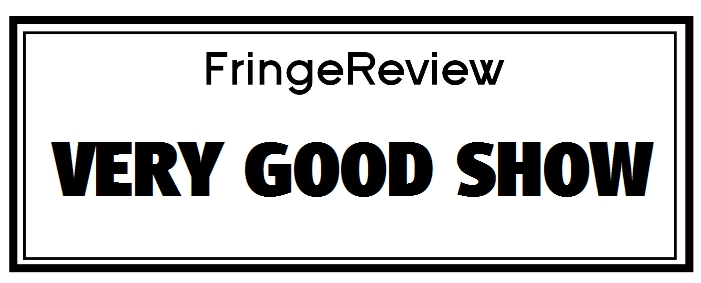FringeReview UK 2023
Irrelevant
Le Gallienne Theatre Company

Genre: Drama, Mainstream Theatre, New Writing, Short Plays, Solo Play, Theatre
Venue: Seven Dials Playhouse
Festival: FringeReview UK
Low Down
Written, directed and set-designed by Keith Merrill, Music & Graphic Design Guillermo Nazera, Lighting Alistair Lindsay, Official Photographer Michaela Walshe, produced by Le Gallienne Theatre Company in association with Seven Dials Playhouse.
Till January 28th
Review
“I wasn’t always such a bitch… Kiss Lydia for me dear. She could use the action.” Debbie Chazen could never be Irrelevant if she tried. Keith Merrill and his Le Gallienne Theatre Company open the Seven Dials Playhouse 2023 season with Merrill directing his play: a paean to the overlooked everywhere.
In this case the overlooked Millie Grable, fictive ex-RADA actress who reached brief theatre stardom in Britain, very nearly made Scarlett O’Hara, and after a crisis induced accidentally by Clark Gable crashed into being a super-successful agent. Doing for others what she failed to do for herself.
Is it around 1961, as Cark Gable’s still alive and Sean Connery’s just been cast as Bond? It hardly matters. I mean Paul Newman’s pecs are already famous. Throughout this smorgasbord of famed actors whom Millie now lets slip through her fingers, encouraging them to migrate to her ex-partner, or laughing them out, there’s a heavy scent of plot.
Bitter, twisted? Nah. But Millie’s reached a crossroads. Punctuated by calls not returned from people she’s acted for – Sidney Poitier, Connery – she reflects on being beaten as an actress by Betty Grable: “Her tits could act better than she could”; though in truth it was Grable’s legs the studio famously insured for a million dollars. Grable, Gable? The slippage of sexual and gender identity is as light – and gone – as the shadow of a butterfly. “If you ever get a chance to sleep with Clark Gable – take it.” Grable’s full of such advice, and subtexts.
But then Millie was Mildred and for reasons best known to herself it took Mildred a while to realise the name’s a bit, well mildewed, and turn it to Millie. Merrill’s play on names and morphed identities is part tease, part homage, part symbol. If a pre-war British play George and Mildred might have gifted a name that’s as passé as Ethel, Millie herself is Everywoman. “The one thing worse than being overlooked” she reflects “ is being gifted and overlooked.” This is the crux of the play, as Millie proclaims: “If you ask if you’ve hit rock bottom then you haven’t.” Merrill’s at his considerable best at such moments. You don’t forget what Millie’s said; especially as delivered by Chazen, swirling regally, lunging for the syphon, drawling dismissal with dropped acid (not that kind) down the telephone.
There’s fine comedic moments. Dancing with the beautiful Rock Hudson, “no actor”, he asks “Have you a brother?” and the two explode with laughter. Chazen scales laughter through bleak unforgetting, tragedy with a shrug, and lost talent with something like a requiem. In a little over 70 minutes we’re treated to the stereophonic inheritance of Brit actress with Hollywood acetylene as Chazen moves round Merrill’s meticulous casting-office set: lush with rather late-1960s chrome-and-black chairs (I really think Merrill makes a point: Millie’s almost singing outside time altogether here), more trad cabinets and vintage-sourced circular baize tables.
Ranging up the auditorium are all the stars Grable’s ever represented. Guillermo Nazera’s lush echt-Steiner/Korngold music and stylish Art-Deco graphics, and Alistair Lindsay’s lighting suggesting the halo of hallucinatory Hollywood, all work beautifully; as does Merrill’s black costume for Chazen.
In some ways we do span an epoch, and the play, with its single-star delivery – there’s plenty of voices-off from Kacey Ainsworth credited with cameo but who never appears – can lack velocity. It arrives, without any real shift in pace bar what Chazen can do with evenly-produced bon-mots and a chronological span interrupted by the telephone; and Chazen’s way of cutting off all the interruption occasioning yet another put-down. It is delicious, though can be samey.
Could it be a slightly shorter play and enliven the EdFringe, or Brighton’s? Chazen – despite Millie’s jokes about that close-up and De Mille – really is too big for that. And yet… Merrill has crafted an Everywoman (and man) for whoever’s gifted yet still never makes it, explaining why: there is no reason. In extending heartfelt tributes to theatre and theatre-making in this darkening world, you can’t help rooting for Merrill and this production. In Millie he’s created someone special, and Chazen revels in it. The production needs a nudge of velocity and a bit more shape. And why Chazen doesn’t take a curtain-call is a mystery: it deflated the press-night audience, who were baffled. Chazen needs a bit of love too.
The Seven Dials Playhouse might be a new name but you’ll probably know it: it’s the rebranded Actor’s Centre that closed during the pandemic. Same building at 1a Tower Street – just up along Earlham Street from the Donmar and Cambridge Theatres, with a refurbished – still very recognizable – space.
The theatre company name’s inspired by queer actresses Eva Le Gallienne and Leonora Duse. There’s pedigree in the name too – Eva’s famed for introducing Chekhov to America, translating Ibsen and winning an Emmy, and much more. Yet she’s vanished. Her equally Danish-translating father Richard Le Gallienne was a well-known, occasionally memorable 1890s poet who had an affair with Wilde (two poets before Bosie). Deliciously both father and daughter are stigmatised by some with “alcoholism and womanising” – the alcohol constantly consumed by Grable seems another homage. Caveats and teething aside, I look forward to a lot more of this kind from Merrill’s Le Gallienne.


















































